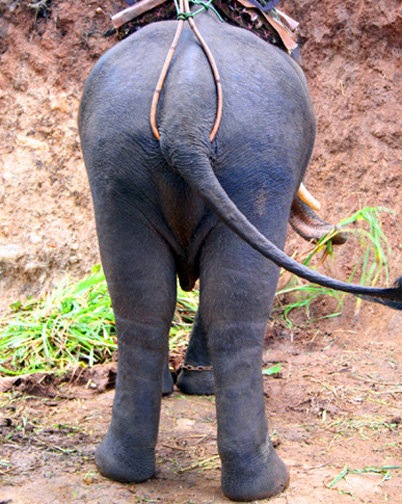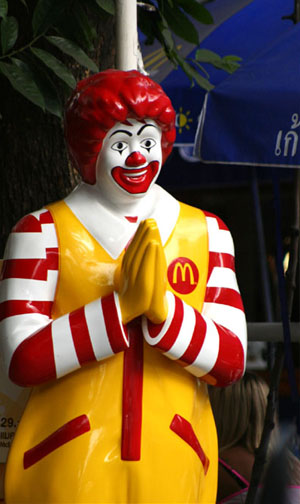As tempted as I am to do it again, I won’t.
I’ve been visiting Thailand for enough years that I’ve picked up on a lot of the Thai language, and when it is important can make myself understood. I’d learn more, but since I’m still in the process of learning English I thought I’d master that language first. The Thai I have learned is due to conducting business in the Kingdom; I’ve learned repeating an English word over and over, possibly louder each time, just never seems to help in the comprehension department. Since it is to my benefit, and the benefit of my bank account, I’ve learned enough Thai that I can get whatever it is I need to accomplish done with the least amount of confusion and error as possible. As a tourist, however, there is no real need to learn any Thai. And I just plain do not use the Thai I do know. None. Zip. Nada. Zilch.
It’s nice to be able to understand what locals are saying, or at least catch the gist of it, when they don’t know you can understand them. You learn a lot. Not all of it good. My friend Noom assumes I know nothing. And that covers knowing nothing about the Thai language too. Occasionally, I’ve slipped and he gets a worried look on his face but then quickly forgets about it. The norm for me is English only and the dumb farang is easier for him to understand.
When I say I do not use any Thai, I mean none. The first time I met Noom’s sister-in-law, when she made up a batch of her chili-mango sauce for me to take home I thanked her. In English. Noom, who had been carefully watching the exchange told me in his best professorial voice, “In Thailand we say Sawatdee Kap.”
I smiled at him with all the sincerity I felt and thanked him for his instruction. In English.

Thais will be more impressed with your ability to find a toilet on your own than with the fact you learned how to say it in Thai.
Okay, so yes I do tend to take things to the extreme; it wouldn’t kill me to throw a Sawatdee kap in every now and then. But I’ve noticed, much like the wai, frequent visitors to Thailand tend to use guidebook Thai with abandon. It’s often Thai words or phrases that the locals hardly ever use. Unless they are talking with frequent visitors to Thailand. The farangs who pepper their speech with sanooks, and mai pen rais, don’t do so to be understood. They do it to show off their superiority, to make sure everyone knows how native they’ve gone. Wow! You’ve learned to say toilet in Thai! I’m so impressed!
Those who actually make an attempt at learning Thai impress me, especially when they are but casual visitors to the country. Many of those who move there don’t make the effort, and I think they are the ones who should. But half-assed attempts should be avoided by all. You only look the fool. Same for those who have adopted the wai as a form of greeting and busily wai to every Thai they run across, be it child, hotel employee, or Ronald McDonald.
There is an argument often put forth that learning and using guidebook Thai and the wai is a sign of respect. That even if you get it wrong, the Thai people will appreciate your efforts. That makes sense. Unless you ask a Thai how they really feel about that. You don’t need to know Thai to understand their response. The giggling alone should clue you in.
If you are going to use the ‘shows respect’ argument, follow through with the thought. Because what you are really saying is “I don’t respect you enough to bother to actually learn your language or even the proper way of using the little I do know.”
The most cringe-worthy misused Thai word is khun. Khun does not have an exact translation in English. In English, the closest word we have is Mister. So Thais use Mister when they are attempting to speak English. Which explains the odd but frequent use of Mister along with your first name. That a Thai will often do the same with a woman’s name should give you a heads up that there might be something missing in translation. Instead, farang idiots run around calling everyone they know Khun whatever.
Don’t.
Khun is an honorific. It fills a specific need in the stratified Thai culture. In most cases, there is a more appropriate honorific to use. Using Khun instead can be insulting. It is closely related to the use of Doctor as an honorific for someone who has a Ph.D. in the West. Sure, you can call them Mister instead, but all you are doing is proving your ignorance when you do. In Thailand, Khun is used to an inferior, or to someone of the same age, same economical position, same level of social status, same everything. And that’s not ‘or’ it’s ‘and’. If there is a higher rank in any of those there is a different honorific to be used.
Khun is also used by Thais when they do not yet know what the social status is of a person they have just met. Though even then if there is an age difference they will usually fall back on the appropriate honorific, or a more casual word if the introduction is casual and familiar. Thais will use the Khun honorific to farang, and it is meant as a sign of respect (as opposed to just using your name). They use Khun toward farangs because they do not know where you fall on the social ladder. And since you are not Thai, you really don’t anyway. In the business world, however, you are generally a known entity and the appropriate honorific will be used. And then you should take the time to learn the appropriate honorifics for those with whom you do business too.
The biggest losers are those who call themselves Khun whatever. I’ve heard farang introduce themselves as such. I would pull them aside and explain why that is incorrect (you never use an honorific toward or about yourself) but realize in most cases it’s not just that they are ignorant, but that they are a pompous ass. And while I seldom if ever use Thai outside of the business world, with pompous asses I always use the honorific Khun.




I took a Thai language class offered by my local adult ed department after my first trip and before the second. The tones are almost impossible. At least they were for me to get the hang of. I did find it useful for learning a few words and phrases. And it has come in handy once or twice in a taxi. But meeting one time a week for 3 hours for 10 weeks isn’t really much for language learning.
But I do use “kob khun” for thank you very often. And Sawtdee as a greeting. And knowing numbers is useful too.
And a lot of the tonal inflections we don’t even hear. I don’t think thanks and hello fall under guidebook Thai though – you’re just more polite than I am Glenn.
yeah, I think that was definitely part of the problem. My ear just doesn’t hear the differences in the tones. Our teacher would make us keep repeating the word until we happened to hit the right one.
and then having no idea how you pronounced it differently I’m sure!
OHHHHH, they’ve renovated Silom Central’s toilets, very nice.
Ummm what were you on about again? Oh yes, useful Thai words, Mai Aow. Works for me.
🙂
I have a look to throw that says that much more clearly.